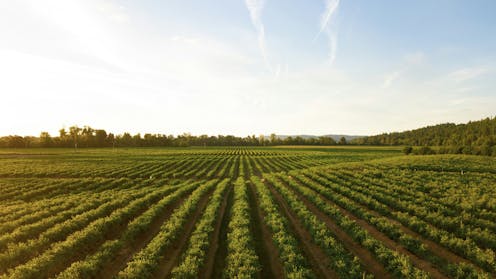what’s on the table, and what’s missing?
- Written by Nick Rose, Senior Lecturer, William Angliss Institute

In 2023, a parliamentary inquiry into food security[1] was held in Australia. This involves the government asking for public and expert advice on key issues to make better decisions.
The inquiry drew 188 submissions from experts across the food system, including farmers, health experts, community organisations and advocacy groups. This reflects both the scale of the issue and the vast expertise Australia could draw on to address it.
Two years later, the federal government is now using this advice to develop a national food security strategy, called Feeding Australia[2]. The inquiry’s final report contained 35 recommendations to boost the productivity, resilience and security of Australia’s food system to be better prepared for climate change, natural disasters and other disruptive events.
Household food security[3] helps:
- people lead healthier lives
- reduce the burden on important infrastructure (like hospitals)
- improve mental wellbeing
- create equity and stability in communities
- fulfil a human right.
Australia is at an important moment. Meaningful change and strengthening food security could help millions of Australians well into the future.
And yet, while the inquiry marks a step forward, our analysis[4] of the expert submissions reveals several key areas were left unaddressed.
Key issues from the experts
Our analysis found the experts shared many key concerns about Australia’s food security preparedness.
National food security policy:
Stakeholders strongly supported the need for coordinated national policy. Many submissions called for whole-of-government collaboration and a “national food plan”. They also demanded oversight and accountability to fall under a new “minister of food” role in government.
Cost-of-living pressures and food insecurity:
Another consistent theme was the link between the cost-of-living crisis and food insecurity (struggling to pay for food).
This is due to welfare payments being below the poverty line, stagnant wages and soaring housing costs[5]. Research shows one in eight households[6] are affected by food insecurity.
The experts also emphasised that emergency food relief, while necessary as a crisis response, is not a long-term solution.
Instead, they called for structural reforms. This includes raising government benefits above the poverty line and expanding affordable housing. These suggestions are backed by current research[7].
Sustainability and climate resilience:
Environmental concerns were also central. Many submissions stressed the need for Australian agriculture to transition toward regenerative practices. These can include[8] limited or no tilling of the soil, using ground-cover crops to support water retention, or rotating livestock to prevent soil damage.
This would reduce reliance on herbicides and synthetic fertilisers, a strategy also backed by recent research[9].
For many experts, climate change adaptation goes hand-in-hand with food security. Many submissions urged action to protect farmland from urban sprawl, improve funding and education for urban agriculture, and prepare for climate shocks such as droughts and floods.
What was missing?
While the inquiry’s 35 recommendations for a national food security strategy addressed many of these key concerns, there were gaps.
For example, there was no mention of Australians’ basic “right to food” – this has been legislated in 120 other countries[10].
Also missing: the need for clearer food labelling and stronger trade regulations on food to protect people’s health and the environment.
Roadmap for a food secure Australia
The submissions point to a roadmap for a truly food-secure Australia – one that is just, sustainable and resilient. A national strategy can build on these submissions and be informed by best practices internationally.
Here are our four recommendations, drawn from our research:
1. Legislate the right to food: Recognising food as a human right[11] would provide a legal framework to guide all policy decisions. This would allow government responses to food insecurity to move beyond band-aid approaches and align with leading international standards.
2. Establish a national food plan and governance framework: Submissions overwhelmingly called for a fully funded, whole-of-government[12] national food plan, in addition to a dedicated minister for food and a National Food Security Council comprised of diverse stakeholders.
But to ensure success, the future strategy needs to include measurable targets, reporting requirements and annual funding. Further, it should be centred on health, sustainability and equity goals.
3. Address structural drivers of food insecurity: Poverty[13] and housing insecurity must be treated as food policy issues. Raising income support payments, investing in affordable housing, and ensuring access to local community food resources (including in remote, regional and First Nations communities) are essential.
4. Transform food systems for health and sustainability: Our health depends on healthy ecosystems[14]. As such, a national food security strategy must invest in regenerative farming[15]. This would protect farmland, encourage local food economies and ensure harmful industries are properly regulated.
It should also boost investment in our national food transport and infrastructure systems (such as storage and warehousing).
And we must limit the power of the supermarket duopoly over food supplies and costs. This would ensure fairer outcomes for farmers[16] and shoppers alike.
The national food security inquiry generated a wealth of evidence and ideas for moving forward. Yet, the final report left many of the most pressing issues unaddressed.
To truly secure Australia’s food future, government action must prioritise the systemic drivers of insecurity, inequality and ecological decline.
References
- ^ inquiry into food security (www.aph.gov.au)
- ^ Feeding Australia (www.agriculture.gov.au)
- ^ Household food security (aifs.gov.au)
- ^ our analysis (sustain.org.au)
- ^ soaring housing costs (www.abc.net.au)
- ^ one in eight households (theconversation.com)
- ^ current research (australiainstitute.org.au)
- ^ include (www.abc.net.au)
- ^ recent research (www.frontiersin.org)
- ^ legislated in 120 other countries (www.ohchr.org)
- ^ Recognising food as a human right (onlinelibrary.wiley.com)
- ^ whole-of-government (journals.sagepub.com)
- ^ Poverty (theconversation.com)
- ^ Our health depends on healthy ecosystems (www.acs.gov.au)
- ^ regenerative farming (jorganics.wordpress.com)
- ^ farmers (www.theguardian.com)
Authors: Nick Rose, Senior Lecturer, William Angliss Institute







